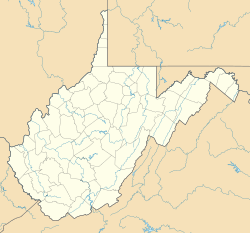Dabney, West Virginia facts for kids
Quick facts for kids
Dabney, West Virginia
|
|
|---|---|
| Country | United States |
| State | West Virginia |
| County | Logan |
| Elevation | 715 ft (218 m) |
| Time zone | UTC-5 (Eastern (EST)) |
| • Summer (DST) | UTC-4 (EDT) |
| Area code(s) | 304 & 681 |
| GNIS feature ID | 1549652 |
Dabney is a small place in Logan County, West Virginia, in the United States. It's known as an unincorporated community, which means it doesn't have its own local government like a city or town. Instead, it's managed by the county. Dabney is about 4 miles (6.4 km) southeast of a bigger town called Logan. This community was also known by another name, Kleenkoal.
Contents
What is Dabney?
Dabney is a small community located in the beautiful state of West Virginia. It's not a city or a town with its own mayor or town council. Places like Dabney are called "unincorporated communities." This means the local government services, like roads and schools, are managed by the larger county, which in this case is Logan County.
Where is Dabney Located?
Dabney is found in the southwestern part of West Virginia. It sits within Logan County, an area known for its rich history and natural beauty. The community is about 4 miles (6.4 kilometers) southeast of Logan, which is the county seat. Being in West Virginia, Dabney is part of the Eastern Time Zone.
Dabney's Other Name: Kleenkoal
For a time, Dabney was also known as Kleenkoal. This name gives us a clue about the history of the area. Many communities in West Virginia, especially in Logan County, grew up around the coal mining industry. The name "Kleenkoal" likely refers to the clean coal that was mined or processed there.
History of Coal Towns
Many communities in West Virginia, including Dabney, were once known as "coal towns." These towns were built to support the coal mining industry, which was very important to the state's economy for many years.
Life in a Coal Town
In coal towns, most people worked in the mines or in jobs related to mining. Houses, stores, and schools were often built by the mining companies. These communities played a big role in providing energy for the country. Over time, as the coal industry changed, many of these towns also changed. Some became smaller, while others found new ways to grow.
 | Valerie Thomas |
 | Frederick McKinley Jones |
 | George Edward Alcorn Jr. |
 | Thomas Mensah |



